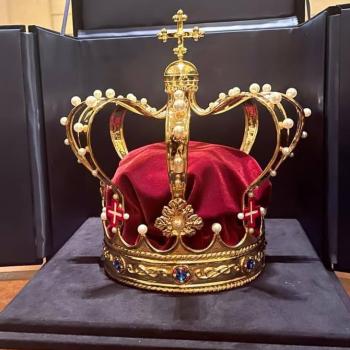So I spent a long weekend in Holland, MI, the heart of Dutch Reform USA and home to Hope College. I was there to talk about Gay Catholic Whatnot, in a variety of settings–a mix of public and private, etc–organized by the St Benedict Forum, the college’s small but growing papist posse. It was a fantastic experience. I’d esp like to note the way aesthetic concerns surfaced throughout the trip. Hope College people really care about sacred architecture and music; the chapel service I spoke at had two beautiful songs that melded contemporary and traditional elements, including one featuring both an organ and an electric guitar.
Anyway, I’ll be posting a lot of things giving you an idea of what I said at various points during my trip. Here’s a presentation about the Three False Gods of American Christianity. Each section ends with a question we’re not asking enough–a question we’ve neglected. I don’t think I have all or even most of the answers to these questions. My answers will conflict with equally-valid answers of other gay or same-sex attracted Christians. All I’m saying is that these are more fruitful questions than the ones we habitually ask about gay people in the Church.
So, the three false gods: marriage, freedom, and morality. The thing about false gods is that lots of them are good things in themselves, which have lost their place in the created order. Poetry and reason are good things (I mean, not all poetry, but you know what I mean) but worship of Apollo, the god of poetry and reason, is a sin against the One God. So too our contemporary false gods are goods for which American affections have become–to coin a phrase–disordered. I would like to put them back in their place.
Marriage. Terms like “intimacy,” “devotion,” “soulmate,” and even “love” itself have been all but colonized by romantic love and, for Christians, marital love. Here I gave my “Lava” example.
Marriage is obviously one of the richest Scriptural images of what love is–and, therefore, what our relationship with God must be. But we have other images also of intimate, devoted love that knits souls together. Filial love; the love of extended family, as with Ruth and Naomi; and friendship, displayed in the covenantal friendship of Jonathan and David and then raised to its summit in the relationships of Jesus and his disciples, with an especial tenderness in His relationship with the beloved disciple, John.
Yet we’re bizarrely incurious about Scriptural friendship. Jesus Himself uses it as an image of sacrificial love and of discipleship. Friendship shaped His life, and continued to shape Christian lives for centuries after His death. And yet we respond to the Scriptural language of friendship with silence; interpretation of these loves as inherently sexual (you see this especially with David and Jonathan); or bowdlerization, as when my friend Chris Damian ran across a Bible translation in which John doesn’t recline on the breast of Jesus, but instead, “John was reclining near Jesus.”
And so when gay people try to figure out what our future might look like in the Church, we have only marriage and maybe religious vocation as images of love. These are our only images of what a good, fruitful, adult life looks like; the only paths of self-gift we are shown. Good luck with that!
What if our images of love included a community of disciples, who became family to those who lost their families or gave up their chance at a socially-sanctioned family for the sake of the Gospel? What if we understood the desire for devoted, lifelong, intimate same-sex love as a good thing–a longing the Church has historically honored in the form of friendship? What if we offered all of our kids, gay straight and whatever Tumblr is doing these days, a future of communities of love–including the Catholic Worker and other intentional communities; godparenthood, which binds the godparents and the parents together as co-laborers; friendships as deep as that of St Gregory of Nazianzus and St Basil the Great, and as practical as the shared households and obligations depicted in Alan Bray‘s work?
There are so many paths open to us. Whether we perceive a specific calling to celibacy and create a celibate partnership through a shared prayer life, or whether we start out in your basic gay couple and end up as Dunstan Thompson and Philip Trower; whether the language of friendship speaks to us more or the equally-Scriptural language of brothers and sisters in Christ–there are so many more forms of love than the ones we’ve been trained to see.
(I wanted to make sure to get Thompson in there because I just revisited Dana Gioia’s terrific essay on his life and work. I am only a semi-fan of Thompson’s poetry but the essay, I super love. One of the events at Hope was going to be boycotted by a student group, but they decided to organize a slam poetry reading instead. I don’t slam poetry (I slam souls) but I wish I could’ve attended and read this lovely tribute from Thompson to Trower.)
So marriage becomes a false god when it crowds out all the other forms of Christian love–including devoted same-sex love. Marriage also becomes a false god when it crowds out celibacy, but that is going to be a separate post. Onward!
Freedom. This is the false god invoked when you hear, “Sure, celibacy is fine if you have a call to that. But most people don’t. And you definitely shouldn’t have to be celibate just because you’re gay.”
I’ve written specifically about the “just because you’re gay” aspect here, but right now, I want to focus on shifting our questions.
I don’t actually perceive a call to celibacy and I’m not good at it, so I have a vested interest, I guess! But this position really seems to misunderstand how God calls us. We have important elements of freedom in our vocations–you can choose your spouse, you can choose your friends. But we also live in conditions of constraint. Many of our vocations are the result of circumstances rather than a perceived call from God–and often these are not circumstances we would choose. If you’re in recovery, for example, and you serve others struggling with addiction, you probably wouldn’t have chosen that path for yourself but you may find it’s a real path of love. Caring for an ailing relative can be harrowing, but it can also be a path of sanctification (as marriage is). The example I always use is one taken from my work with women in crisis pregnancies: That second line comes up on the little plastic test and suddenly you’re staring down the barrel of your call from God.
But this analogy suggests a serious failure on the part of Christian communities. Crisis pregnancy centers exist in part because Christians asked one question, which in fact we counselors were trained to ask abortion-minded women: “What would make it possible for you to imagine having this baby?”
Why aren’t we asking gay people that?
We are asking all these obnoxious questions, like, “How can we proclaim our beliefs without you guys thinking we’re bigots?”, but we never ask, “What would make it possible for you to imagine living this teaching in a way that’s hopeful and loving, not despairing and pointless?”
Morality. Ah, my least favorite of the false gods!
We have created a Christianity that is about doing the right thing–and, even more so, about avoiding sin. About not messing up. We have taught our children a faith that is a catechism, not a liturgy.
Morality, and especially sexual morality, has become the yardstick by which we measure gay Christian lives. (See my “sexualization of gay Christians” post for more.) In too many churches, gay people’s lives, vocations, friendships, self-presentation i.e. are you too butch for church?, are all treated with suspicion and fear. We ask only, “How can this become sinful?”
And we never ask, “What are our kids’ images of God? How do we help people know Jesus as a Friend, and God as the Father of Mercies?”
So many gay people in our churches, maybe especially the ones who “follow the rules,” don’t feel that God cherishes them. They don’t see beauty in their own lives and in their longings, including those beautiful, honorable longings for intimacy and self-gift. They do see beauty in gay marriages, a beauty their churches deny. They hear gay people used as proof of a deranged culture, with maybe a few people who *~*struggle with same-sex attraction*~* held up as plastic saints.
Then-Cardinal Joseph Ratzinger wrote, “I have often affirmed my conviction that the true apology of Christian faith, the most convincing demonstration of its truth against every denial, are the saints, and the beauty that the faith has generated.” And if we look to the saints and to Christian art we find that God cherishes those who lead tumultuous lives. People who never do “get it together.” People who have unusual vocations–the weird saints–or stigmatized ones. The dappled things.
There are ways to integrate morality into a full understanding of God’s love for us. “Lord, I love your commands,” as the Psalmist sings. This post from Pascal-Emmanuel Gobry, “Morality as Worship,” shows the beauty and authority of the moral law, and its place in a life that follows not a rulebook but a Man.
But if we want morality to take its proper place in our faith, we must ask: “Where and when do you know God cherishes you? And where do you see God working in your sexuality?”











